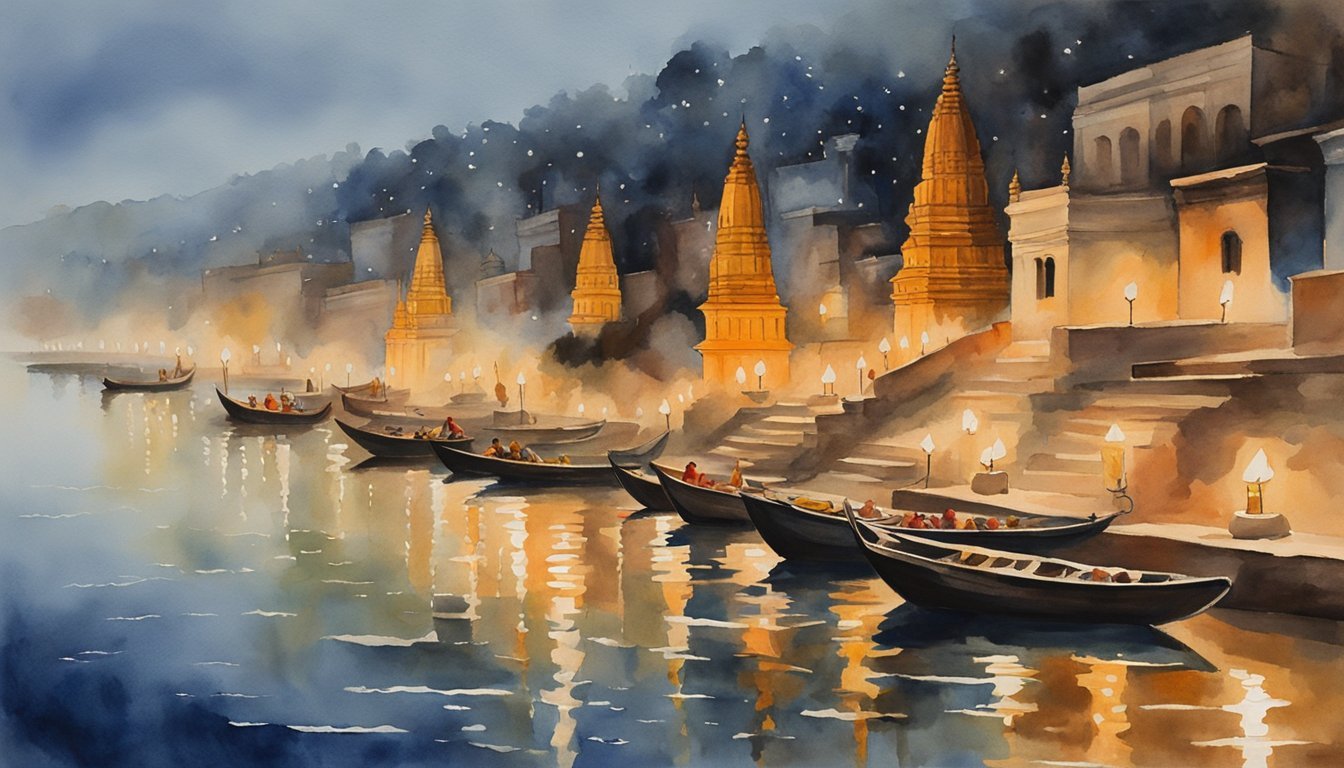Explore Varanasi
Geography and Climate
Varanasi is located in the northern Indian state of Uttar Pradesh, along the banks of the Ganges River. The city is known for its numerous ghats, which are flights of steps leading to the river where people come to bathe and perform rituals. The climate of Varanasi is primarily humid subtropical, with hot summers, cool winters, and heavy monsoon rains.
Historical Significance
One of the world’s oldest continually inhabited cities, Varanasi, also known as Kashi, holds great historical significance. The city has been a spiritual center for Hindus for countless generations. Devotees come here to bathe in the sacred waters of the Ganges and perform rituals for their departed ancestors. Its narrow winding lanes are dotted with ancient temples, bustling markets, and vibrant ghats that narrate tales of its glorious past. The city’s cultural fabric is enriched by classical music, traditional art forms, and age-old rituals that reflect its haunaka history and significance. Visitors from across the world flock to Varanasi to experience its spiritual ambiance and witness the mesmerizing Ganga Aarti at Dashashwamedh Ghat.
Varanasi is also known for its numerous historical landmarks such as the Ramnagar Fort and Chunar Fort. These ancient forts offer glimpses into India’s history and provide panoramic views of the Ganges River.
Cultural Heritage
The cultural heritage of Varanasi is unmatched, with the city often referred to as the spiritual capital of India. The Shri Kashi Vishwanath Temple or the Golden Temple is one of the most famous Hindu temples dedicated to Lord Shiva and attracts thousands of pilgrims every year.
Visitors can enjoy boat rides on the Ganges River, which give a unique perspective of the city and its ghats. They can also attend various cultural events and ceremonies, such as the Ganga Aarti performed on the banks of the river every evening.
In addition to its religious significance, Varanasi is known for its rich artistic and cultural heritage. The city is home to numerous music and dance festivals, as well as a thriving community of artists and craftsmen who produce traditional silk weaving, brassware, and clay pottery.
When in Varanasi, do not miss the opportunity to explore the narrow lanes and bustling markets that give a glimpse of the city’s vibrant cultural landscape.
Spirituality and Religion

Varanasi, also known as Kashi, holds a central place in Indian spirituality as one of its holiest cities. This sacred city has a long history of being a melting pot of diverse religious and spiritual beliefs.
Hinduism in Varanasi
In Hinduism, Varanasi is believed to be the abode of Lord Shiva, one of the principle deities of the religion. The Vishwanath Temple is one of the most famous temples in the city, dedicated to Lord Shiva. According to Hindu mythology, those who die in Varanasi can attain salvation, which helps explain the city’s long-standing association with cremation rituals. The ghats along the Ganges River are often used for cremation ceremonies, especially the Manikarnika Ghat.
Varanasi’s spiritual significance also extends to its many other temples and celebrations. For instance, the annual Bharat Milap festival commemorates the reunion of Lord Rama and his brother Bharata, while the city comes alive with light and devotion during Diwali, the festival of lights.
Buddhism and Sarnath
Buddhism has strong ties with Varanasi and its neighboring region of Sarnath. It is believed that Sarnath is the place where Buddha first delivered his teachings about the Four Noble Truths and the Eightfold Path after attaining enlightenment. The event is referred to as “Dhammacakkappavattana Sutta,” which signifies “turning the wheel of Dharma.” The Dhamek Stupa and the Lion Capital of Ashoka, some of the most revered Buddhist sites, are found in Sarnath.
Other Religious Influences
Jainism, another prominent religion in India, also has deep connections with Varanasi. The city is home to a significant Jain community and is considered the birthplace of two important Jain Tirthankaras, Suparshvanatha and Shreyansanatha. Varanasi’s religious harmony is impressive since it is a place where Hindus, Buddhists, Jains, and followers of other faiths coexist peacefully and with mutual respect. The city’s rich history has also given rise to a syncretic tradition that finds expression in Islamic artisanship.
Great scholars, poets, and saints have shaped Varanasi’s belief system and spiritual heritage across generations. Adi Shankara, Tulsidas, and Kabir are among the many influential figures who have left an indelible mark on the city’s religious fabric. Tulsidas, a 16th-century poet-saint, is known for his composition “Ramcharitmanas,” an epic retelling of the Ramayana in the local Awadhi language. The Bhakti movement, which emphasized love and devotion as paths to God, has also greatly contributed to the city’s spiritual ethos.
Overall, Varanasi is a fascinating tapestry of traditions and beliefs, inviting seekers from around the world to experience its timeless spirituality.

